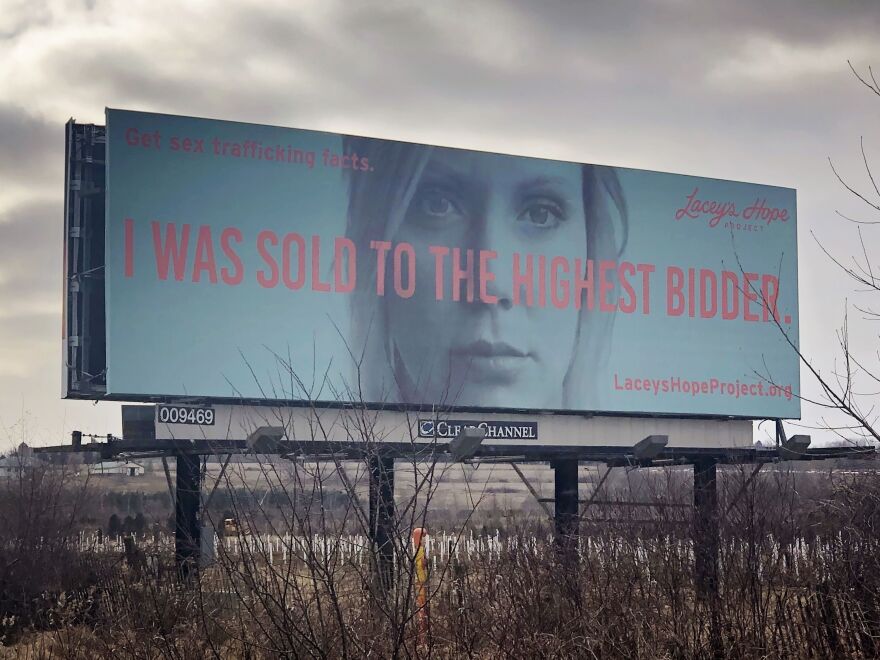Sex trafficking has been reported in all 72 counties across Wisconsin — earning the state a reputation as a hub for the crime. Some elected officials are working to end the problem.
State lawmakers have considered a number of bills in recent years in an effort to toughen laws pertaining to sex trafficking. Federal and state law defines the crime as the use of force, fraud or coercion to compel someone to have sex for money.
But Wisconsin legislators have expanded the definition. Now, people can be charged with sex trafficking just for making money off victims or transporting them -- even if there’s no force, fraud or coercion. Lawmakers also approved a bill that says someone who purchases sex from a child can be charged with trafficking. Yet another law makes it a felony the third time someone is caught paying for sex.
And legislators have additional measures in the works. One aims to educate truckers about trafficking.
“Truck drivers are the potential first responders in the human trafficking travesty. They travel to truck stops, way stations, gas stations, restaurants, thousands of miles more than the average person does, and this is where human trafficking often takes place," former Republican state Representative Joel Kleefisch said while testifying at a legislative hearing in 2017. He was backing a bill that would mandate training for truckers on how to recognize and report trafficking.
Trucker James L. Massey Jr. spoke in support of the measure, and talked about the trafficking he's witnessed at truck stops. “I was trying to put a rough number as to how many women and girls I’ve had knock on the side of my truck, asking if I want ‘commercial company?’ Numbers gotta be right around 100, maybe more," he recalled.
Democratic state Sen. LaTonya Johnson cosponsored the bill. The Legislative session ended before lawmakers acted on it, so Johnson introduced it again this year. She’s also cosponsored another bill called the Safe Harbor Law, and has reintroduced that, as well. The measure would prevent children from being charged with prostitution.
"There’s no such thing as a child prostitute," says Johnson. "These children are not capable of giving consent." She says children facing charges of prostitution have been used by prosecutors to testify against pimps. Authorities sometimes sent child victims of trafficking to juvenile detention facilities, keeping them off the streets, Johnson adds.
"The Safe Harbor law basically now says you can no longer do that. You have to treat these child victims as victims, which means you have to provide them with services, with food, with shelter, with foster care, a safe place to live that these children are now going to be under the guardianship of the state," she says.
New Democratic state Attorney General Josh Kaul says he’s also working to prevent trafficking, including through the Justice Department's Human Trafficking Bureau, started by Kaul's predecessor, Republican Brad Schimel. "Since August of 2017 the [bureau] initiated 79 trafficking investigations, 17 child victims have been recovered and 59 adult victims have been recovered," Kaul explains.
And he says since law enforcement can’t be everywhere, the Justice Department is doing targeted outreach to train and educate hotel and convention workers and others on the front lines to recognize and report trafficking.
But some lawyers and activists say there's more the state could do, especially with legislation that helps trafficking survivors expunge or vacate their criminal records. Kate Mogulescu is an assistant professor of law at Brooklyn Law School. She was involved in grading each state's criminal record relief laws through the Polaris Project, a national anti-trafficking organization.
She also collaborated with Lotus Legal Clinic, an organization that serves trafficked and underserved survivors, to bring training on criminal record relief laws to the Milwaukee area.
"Wisconsin has done what many other states have done, which is limit the ability to clear charges from a record to only prostitution charges," she says. Mogulescu says the law doesn’t reflect that trafficking survivors are frequently arrested for a variety of other offenses, besides just prostitution, in the course of being trafficked.
Editor’s note: This is the fourth part in our series on sex trafficking.






